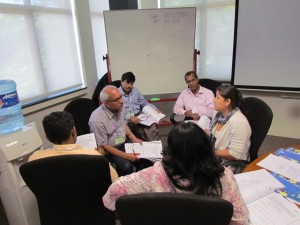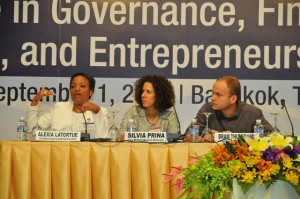Does microcredit for the average poor borrower lead to welfare improvement through business investment, or does it fuel consumption and lead to cycles of high-cost debt? What is the best way to support the accumulation of savings for particular life goals like retirement, the education of one’s children, and financing lump sum investments in housing improvements and preventative healthcare? What types of information or training programs are most effective in enabling the poor to take sound financial decisions around their choice and usage of financial products?
At Innovations for Poverty Action (IPA), we work with policymakers and practitioners around the world to answer these questions through rigorous evaluations. The evidence base created will help financial institutions improve their products and programs to better serve the poor and effect welfare improvements. It is critical to test innovations systematically and compare alternative ways of achieving the same outcomes in order to identify the most effective programs or interventions. Making decisions on which programs and products to scale up, without evidence on relative impact and cost-effectiveness, leaves the sector vulnerable to wasted investments in ineffectual interventions.
Our work, under the umbrella of the
Global Financial Inclusion (GFI) initiative, focuses on enabling evidence-based decision-making for meaningful financial inclusion. What we have realized in pursuing this goal for the past few years is that this requires the creation of not just academic studies, but an ecosystem for systemic inquiry and practice.

Governments, commercial banks, and financial institutions are faced with numerous strategies and product opportunities for improving the welfare of their citizens and clients. In some cases, the information needed to choose between these various options might already be available from the results of rigorous evaluations. At other times, fresh evidence might need to be generated to enable such decisions.
How do we engage with the right stakeholders at the right times in their decision-making cycles to have the right questions studied and the right policies affected through the body of evidence we generate?
To do this, our initiative is characterized by a three-pronged approach, over and above the design and implementation of randomized evaluations:
developing widespread capacity to generate and interpret evidence;
supporting the creation of new research partnerships on financial inclusion; and
constant dissemination, discussion, and utilization of the findings to inform practice and policy.
The creation of knowledge on which programs for financial inclusion work and which ones do not, or need changes that will allow them to be effective in alleviating poverty, is partly constrained by the number of people who can engage in pursuing these questions with the right research tools. The methods used to conduct robust impact evaluation studies that are not compromised by biases rising from self-selection, or from omitting control factors that might drastically influence the result obtained, require adequate training and exposure.
Research Methods Workshops on Randomized Evaluations
We work with researchers, particularly in Sub-Saharan Africa and South Asia, to create a network of scholars who can help spearhead new studies, advocate for more rigorous research and evaluation in the field, and inform policy decisions on savings and payment interventions.
Previous workshops for researchers based at local universities and academic institutions were conducted in Kenya (involving 20 competitively-selected African researchers) and Sri Lanka (involving 16 South Asian researchers).
Our next workshop will be conducted in Kampala, Uganda on June 20-22, 2013.
Matching Researchers and Practitioners to Generate New Research Ideas
Creating a space for financial service providers and researchers to sit together and engage in conversations that are both operationally critical and knowledge enhancing is no easy task. However, projects designed collaboratively between researchers and practitioners are crucial towards developing more useful and scalable research that is, at the same time, pushing the boundaries of knowledge.
To that effect, we host matchmaking workshops that bring selected researchers and practitioners in conversation with each other, to discuss research ideas and vet possible collaborations through preparatory research and piloting.

The first workshop was held in Bangkok, Thailand in August, 2012 and brought together 24 researchers and practitioners, leading to 17 joint research pitches, of which five received pilot grants.
Our next training and matchmaking workshopis being held in Lima, Peru on May 28-30, 2013. Although the deadline for applying has passed, interested practitioners should write to
fcresearch@poverty-action.org for information on matchmaking and training opportunities.
Research begins with problems observed in the real world, but insights gained from meaningful research are most useful when they feed back into and influence the way the world works. Disseminating, discussing, and applying the evidence generated by randomized evaluations is critical to having them serve their purpose in enabling better investment of scarce resources in achieving welfare improvements for the poor. We produce material and organize events that do just this!
Application to Policy and Practice
On May 31-June 1, 2013, the
Evidence on Innovations in Financial Capability conference will take place in Lima, Peru. The research presented here will highlight innovations in the financial capability space, focused on Latin America, and identify gaps that can be targeted by future research. Conference sessions will cover evidence on recent innovations in financial education, and ways of addressing behavioral biases through product design.
A conference presenting
Evidence on Innovations in Savings and Payments will be hosted in Kampala, Uganda on June 24-25, 2013. The event will showcase results from recent evaluations in Africa on child and youth savings, the impact of reducing costs barriers to saving among the poor, behavioral impediments to saving, using mobile phones for behavioral change, and the adoption and impact of mobile money.
Shifting the policy dialogue towards evidence-based decision-making is arduous. The complexities of implementing development programs are countless, and introducing a systematic research component to allow every program to know its own impact in an unbiased fashion adds more layers of planning and organization.
We want to make it easier to know what each dollar of investment in development programs achieves. This will ultimately allow us as a community of practitioners, policymakers, funders, and researchers to pursue the most promising avenues to achieving meaningful financial inclusion, not just now, but into the future.
 Governments, commercial banks, and financial institutions are faced with numerous strategies and product opportunities for improving the welfare of their citizens and clients. In some cases, the information needed to choose between these various options might already be available from the results of rigorous evaluations. At other times, fresh evidence might need to be generated to enable such decisions.
Governments, commercial banks, and financial institutions are faced with numerous strategies and product opportunities for improving the welfare of their citizens and clients. In some cases, the information needed to choose between these various options might already be available from the results of rigorous evaluations. At other times, fresh evidence might need to be generated to enable such decisions.  The first workshop was held in Bangkok, Thailand in August, 2012 and brought together 24 researchers and practitioners, leading to 17 joint research pitches, of which five received pilot grants. Our next training and matchmaking workshopis being held in Lima, Peru on May 28-30, 2013. Although the deadline for applying has passed, interested practitioners should write to fcresearch@poverty-action.org for information on matchmaking and training opportunities.
The first workshop was held in Bangkok, Thailand in August, 2012 and brought together 24 researchers and practitioners, leading to 17 joint research pitches, of which five received pilot grants. Our next training and matchmaking workshopis being held in Lima, Peru on May 28-30, 2013. Although the deadline for applying has passed, interested practitioners should write to fcresearch@poverty-action.org for information on matchmaking and training opportunities.











